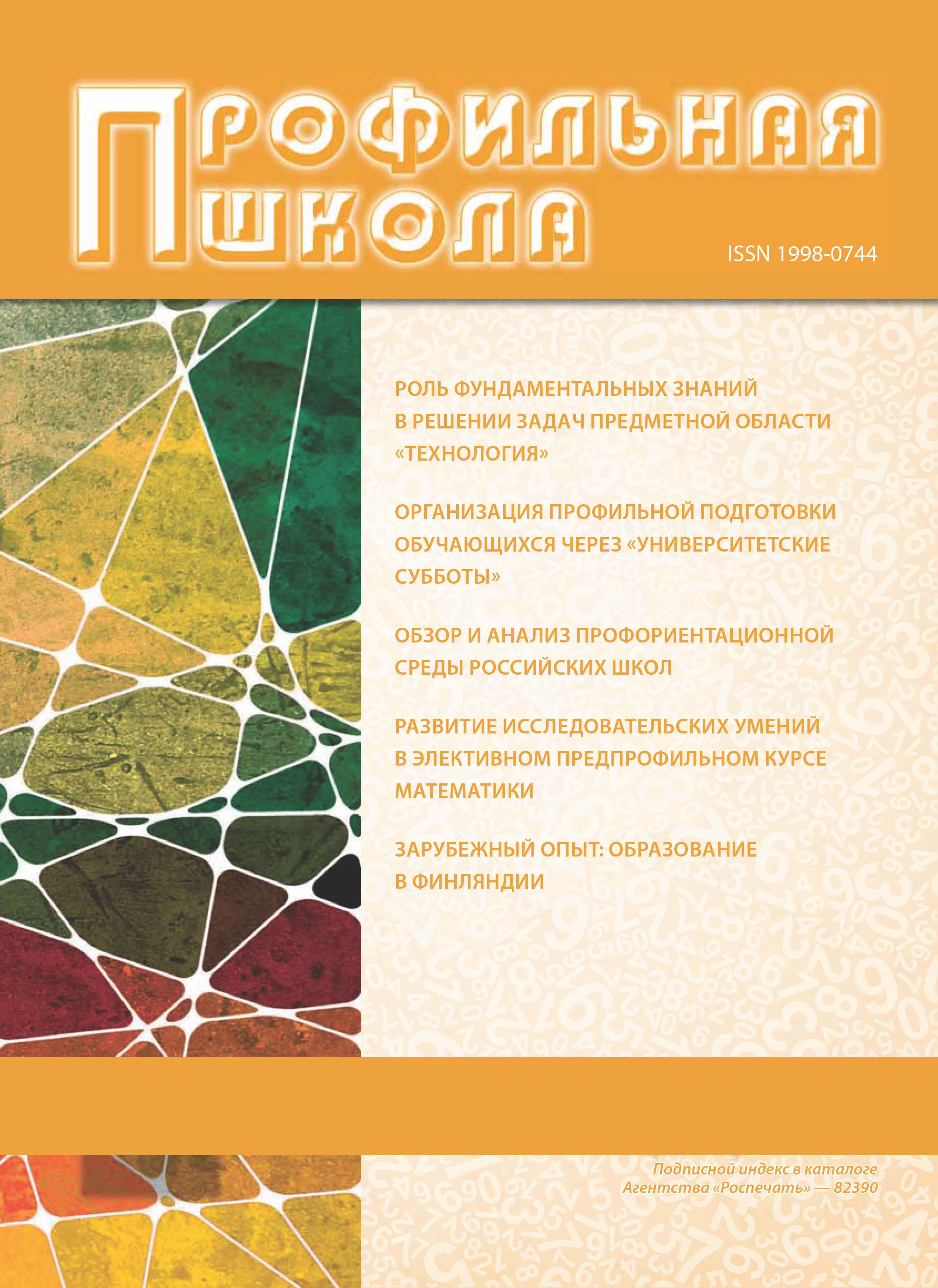Saransk, Saransk, Russian Federation
The article shows the importance of professions in the field of IT. The problems that arise when applicants choose professions in this area are noted. In particular, difficulties in mastering the exact sciences at school, underestimation of the importance of information technology in solving professional problems, low motivation. It is noted that such a direction of informatics as "Social informatics" can help in choosing professions in the field of IT, but there are not enough teaching hours on this topic and the material is mostly theorized. To solve this problem, it is proposed to include an elective course “Fundamentals of Social Informatics. Creation of a chat bot”, where students, along with theoretical questions, would learn practice, namely, programming chat bots. Two online constructors are highlighted that can be used for learning - BorisBot and Botmother, and the basics of working in them are shown. The development of an elective course with an emphasis on the module "Practical issues of creating chat bots" is given, which provides classes in which high school students learn to program chat bots.
chatbots, elective course, education, programming, career guidance, high school students, IT-sphere
1. Andrejchuk A. V. Creation of conditions for the development of scientific and technical creativity and innovative activities of schoolchildren in the children's technopark “Kvantorium”. Voprosy pedagogiki [Issues of Pedagogy]. 2019. no 3. pp. 22-29. (in Russian). EDN: https://elibrary.ru/ZBAIVN
2. Antonova M. V. Vocational guidance educational environment of the regional children's technopark. Professional'noe obrazovanie. Stolica [Professional education. Capital]. 2018. no 5. pp. 18-24. (in Russian). EDN: https://elibrary.ru/YXOTRD
3. Bedina A. V. The work program of the elective course The work program of the elective course “Problems of social informatics”. Available at: https://infourok.ru/elektivniy-kurs-po-informatike-dlya-klassa-problemi-socialnoy-informatiki-chas-v-nedelyu-1978880.html (accessed 18 July 2022). (in Russian).
4. Voznesenskaya N. V., Bazarkin A. F., Zubrilin A. A., Kozyreva YU. A., Korchina O. A. Improvement of additional general education programs in the centers of youth innovative creativity. Obzor pedagogicheskih issledovanij [Overview of pedagogical research]. 2021. vol. 3. no 2. pp. 177-180. (in Russian). EDN: https://elibrary.ru/QCNNRZ
5. Goryachkin B. S., Galichij D. A., Capij V. S., Burashnikov V. V., Krutov T. YU. Efficiency of using chatbots in the educational process. E-SCIO [E-SCIO]. 2021. no 4 (55). pp. 529-551. (in Russian). EDN: https://elibrary.ru/ZHMMFM
6. Grigor'ev D. V. Children's technoparks: launch of a new educational format. Narodnoe obrazovanie [Public education]. 2016. no 7-8 (1458). pp. 57-64. (in Russian). EDN: https://elibrary.ru/YLNXYT
7. ZHukov V. YU. Experience in implementing the programs of the subject "Technology" on the basis of the Children's Technopark “Quantorium”. SHkola i proizvodstvo [School and industry]. 2022. no 3. pp. 29-35. (in Russian). EDN: https://elibrary.ru/AVUBKZ
8. Zubrilin A. A., Karandaeva A. V. Center for Youth Innovative Creativity as a tool for profiling in the field of informatics. Profil'naya shkola [Profile school]. 2017. vol. 5. no 5. pp. 27-33. (in Russian) DOI:https://doi.org/10.12737/article_59d4cd39881b55.08630847 EDN: https://elibrary.ru/ZMWHRB
9. Zubrilina M. S., Tereshkina K. YU. Situational tasks as a tool for teaching information security to schoolchildren. Informatika v shkole [Informatics in school]. 2018. no 1 (134). pp. 21-23. (in Russian) EDN: https://elibrary.ru/YRENQW
10. Il'ina E. A. The work program of the elective course “Fundamentals of Social Informatics”. Available at: https://multiurok.ru/index.php/files/elektivnyi-kurs-27.html (accessed 18 July 2022). (in Russian).
11. How Russians will be taught and retrained as IT specialists in 2022. The main thing. Available at: https://secretmag.ru/cifrovaya-ekonomika/kak-rossiyan-budut-uchit-i-pereuchivat-na-aitishnikov-v-2022-godu-glavnoe.htm (accessed 18 July 2022). (in Russian).
12. Korotkovskaya E. S. The main risks of the development of children's technology parks “Quantorium”. Matematicheskoe i komp'yuternoe modelirovanie v ekonomike, strahovanii i upravlenii riskami [Mathematical and Computer Modelling in Economics, Insurance and Risk Management]. 2019. no 4. pp. 163-169. (in Russian). EDN: https://elibrary.ru/SLUDBH
13. Kostochkina O. V., Groshevaya O. V. Children's Technopark: a new model of an out-of-school institution. Znanie [Knowledge]. 2019. no 11-1 (75). pp. 49-60. (in Russian). EDN: https://elibrary.ru/LINSTI
14. Krekhalev V. V., Krekhaleva S. V. The role and methods of reflection in the context of the educational activities of the Children's Technoparks. Mezhdunarodnyj zhurnal gumanitarnyh i estestvennyh nauk [International journal of humanities and natural sciences]. 2022. no 4-1 (67). pp. 116-119. (in Russian) DOI:https://doi.org/10.24412/2500-1000-2022-4-1-116-119 EDN: https://elibrary.ru/QBTAIW
15. Forges of personnel. Russian universities are preparing to increase the flow of applicants for IT specialties. Available at: https://lenta.ru/articles/2022/05/26/kuznica_it (accessed 18 July 2022). (in Russian).
16. Kushchij E. N. Work program of the elective course “Social Informatics”. Available at: http://armsosh23.ucoz.ru/docum/Sved_ObOr/obrazov/Rprog10_11/r12.pdf (accessed 18 July 2022). (in Russian).
17. The government launches a preferential mortgage program for IT specialists. Available at: http://government.ru/docs/45334 (accessed 18 July 2022). (in Russian).
18. Approximate basic educational program of secondary general education / Approved by the decision of the federal educational and methodological association for general education (minutes of June 28. 2016. no. 2/16-z). https://base.garant.ru/71809212 (accessed 18 July 2022). (in Russian).
19. Gužíková Ž., Chicevic S., Kostrub D., Brychová S. Digital Technologies and Their Application in a Child's Life. Acta Educationis Generalis. Feb 2022. vol. 12. no 1. p.23-40. http://dx.doi.org/10.2478/atd-2022-0002
20. Passey D. Digital Technologies-And Teacher Wellbeing? Educ. Sci. 2021, 11, 117. https://doi.org/10.3390/educsci 11030117.






